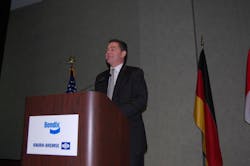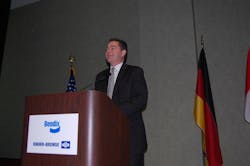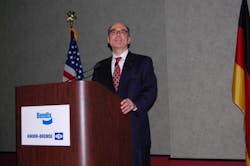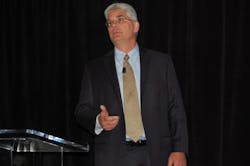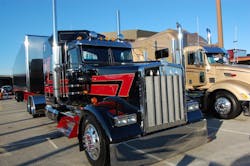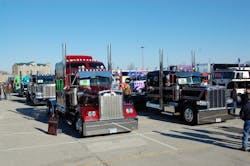Tackling near-term regulations, taxes, and tolling efforts
Like it or not, they are just part of the cost of doing business as a motor carrier, construction fleet, etc.
Yet the price tag for regulatory initiatives, proposed tax hikes – the latest yet another attempt to boost the existing 12% federal excise tax or “FET” on new trucks – and toll-gathering efforts worry a lot of folks, especially in terms of how raising such costs affects the ability to companies to invest in safety systems.
“One of the things that keep me up at night is the impact of continuous regulatory change on our industry,” noted Joe McAleese (above at left), chairman, president and CEO of Bendix Commercial Vehicle Systems during the annual Mid America Trucking Show (MATS) last week.“That raises the cost of day-to-day operations and the cost to acquire new equipment,” he stressed. “As a result, that slows down the adoption rate of new safety technology.”
Fred Andersky (at right), director of government affairs at Bendix, added that several new rules are in the works as we speak, with the most near term a mandate to incorporate electronic stability control or ESC on commercial vehicles. Here’s his rundown:
- The National Highway Traffic Safety Administration (NHTSA) recently sent its ESC mandate over to the Office of Management and Budget (OMB) at the White House; typically the last stop on a rulemaking journey. Andersky said that as it stands right now the final version of the ESC mandate should be issued on May 7.
- The ESC rule will come out in two phases, with the first expected to mandate that technology for highway tractors and motor-coaches starting with 2017 models.
- A recent petition sent to NHTSA calling for collision mitigation technology to be mandated on Class 3-8 commercial vehicles is getting legs, Andersky reported, with a potential rulemaking effort predicted to get started in 2017 with any mandates expected to take affect by the end of the decade.
- Related to that, Bendix and others in the industry are seeking to make a two-year “windshield clearance exemption” that expires this November permanent. That exemption allows forward-looking camera systems to be installed in the “windshield wiper path” and thus is critical to making collision mitigation technology work effectively.
- So-called “Phase II” greenhouse gas [GHG] rules are now expected to be issued by NHTSA and the Environmental Protection Agency (EPA) in 2016.
“For the first time, we’re correlating mandates with customer benefits,” he explained. “So those rules are going to work for everyone’s best interest.”
Yet as always where government bureaucracy is concerned, it’s the how the rule’s details get fleshed out that’s generating the most worry in trucking circles.
“We want to make sure these rules create a level playing field for everyone,” Fier (above on the right) emphasized. “They need to be fair, meaningful and stable so we engineers can see far enough out to deliver solutions with confidence and reliability.”
In his view, the first phase of the GHG rules really only “set the baseline” for the Phase II. “The issue with the next round [of GHG rules] is how aggressive they will be,” Fier explained – an “aggressiveness” that typically translates into added equipment costs in the minds of many fleet executives.
Perhaps unsurprisingly, this concern regarding higher equipment sticker prices surfaced recently as some members of Congress launched a “pre-emptive strike” of sorts to quash any ideas about boosting the existing 12% FET on trucks.The Truck Renting and Leasing Association (TRALA) and American Truck Dealers (ATD) are just two groups supporting a bill crafted by Rep. Reid Ribble (R-WI) and Tim Walz (D-MN) that “re-affirms congressional opposition” to any increase of FET new heavy-duty tractors, straight trucks, and trailers.
TRALA President and CEO Jake Jacoby noted that the 12% FET on average adds $20,280 to the cost to purchase a new heavy-duty truck, adding that compliance with the EPA’s nearly decade-long effort to reduce exhaust emission pollution added another $28,000 to the average cost of a new commercial vehicle.
"Any increase in the FET would add another obstacle to getting the newest, safest, most technologically advanced trucks on the road,” Jacoby noted in a statement.
“The existing 12% levy on heavy duty trucks is already the highest excise tax imposed by Congress on a percentage basis," added Eric Jorgensen, ATD’s chairman and a Wisconsin Peterbilt truck dealer."With a highway bill and comprehensive tax reform on the agenda in Washington, H. Con. Resolution 33 sends a clear message to Congress that hiking the FET on commercial trucks should not be on the table.”
Originally imposed to help defray the cost of World War I, the FET on heavy-duty trucks has long outlived its purpose, Jorgensen added, and what's more, since 1955, the excise tax rate on most new heavy-duty trucks, tractors and trailers has ballooned by 300% since then – going from just 3% when it was initially incorporated into the Highway Trust Fund (HTF) to its current rate of 12%.
Then there’s the recent effort as part of negotiations to pass a long-term surface transportation funding bill to “relax” bans on allowing tolling operations of existing interstates – an idea trucking firms are not fond of.
“The recycled plan to lift the ban on tolling existing interstates has aged horribly in the year since it was first offered,” noted Julian Walker, spokesman for Alliance for Toll-Free Interstates, in a statement.
“Tolling interstate lanes that drivers now freely access is an inefficient financing mechanism that is the worst possible approach to raising transportation revenue,” he explained. “This plan would also let states redirect toll revenues to completely unrelated projects, abusing public trust and exploiting highway drivers with a tax on interstates to pay for trolleys, public transit, and unspecified environmental projects, all without solving the transportation funding problem.”
Just goes to show that trucking continues to face all sorts of cost issues that could potentially burden its business ledger in the months and years ahead.
